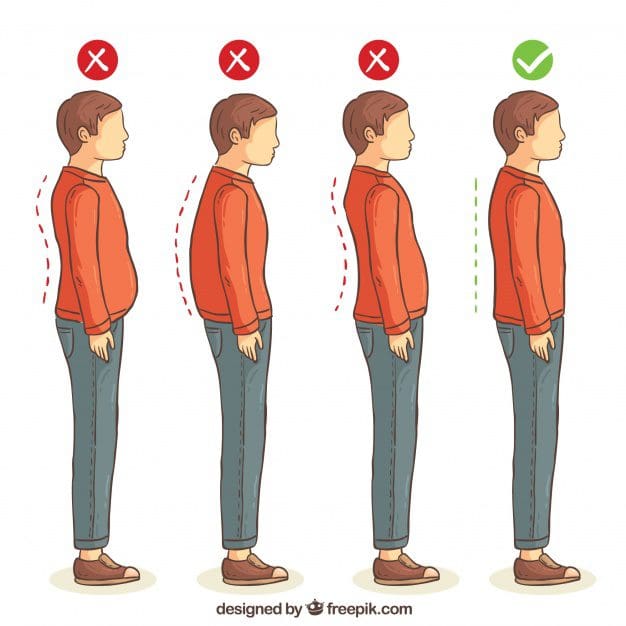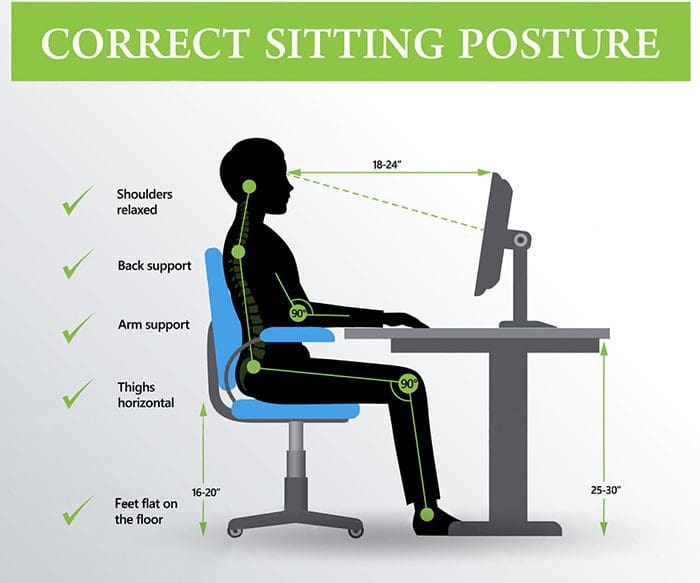Fixing Posture?
Table of Contents
Fixing Posture: What Loved Ones Must Know…
Posture Specialty: Posture is defined as the position in which you hold your body upright against gravity while standing, sitting, or lying down. Standing correctly visually reflects on an individual’s health and ensures the joints and muscles, and other body structures are working properly. Dr. Alex Jimenez gives his insight and distinguishes the most common defects throughout a compiled group of articles. He also specifies the recommended fix-it actions an individual should take to improve their stance and enhance their overall health and wellness. Sitting or standing improperly can occur unconsciously, but recognizing the issue and correcting it can ultimately help many individuals develop a healthier lifestyle. It is all about fixing your posture before it’s too late. With proper posture specialty awareness, body mechanics remain stable for a lifetime facilitating overall health.
 Why Posture Important
Why Posture Important
Appearance benefits with good posture are obvious, but there are many less-obvious health benefits you should know. Good posture can:
- Maintain correct alignment of bones and joints
- Reduce stress on ligaments, minimizing the risk of injury
- Prevent muscle strain, overuse, and pain
- Conserve energy as muscles are used more efficiently
- Decrease abnormal joint wear
Research has shown that poor postures may increase feelings of depression, affect your digestive tract, and influence confidence and stress levels.
Signs You Have Poor Posture
 There are many indicators of poor posture, but some of the more common are hunched shoulders, rounded shoulders, rounded upper back, forward head carriage, and arched lower back. Another indicator is back pain. Unsure if you have good posture? Talk to the posture specialty chiropractor or schedule an appointment for a spinal examination.
There are many indicators of poor posture, but some of the more common are hunched shoulders, rounded shoulders, rounded upper back, forward head carriage, and arched lower back. Another indicator is back pain. Unsure if you have good posture? Talk to the posture specialty chiropractor or schedule an appointment for a spinal examination.
Poor posture does not always present with spine or extremity pain initially since many individuals have the joint strength and mobility to correct abnormal positions and minimize stress. However, not all have good postural habits and the ability to correct poor positioning. This can lead to chronic stress and wear down normal joints to accommodate for these poor positions.
Contributing Factors To Poor Posture
There are several common factors linked to poor posture:
- Stress
- Obesity
- Pregnancy
- Weak postural muscles
- Abnormally tight muscles
- High-heeled shoes
The Effects of Poor Posture
-
Pain in the Back, Neck, and Shoulders – Poor posture can cause stiffness or pain in any of these areas. The longer you sit or stand with bad posture, the more pronounced these pains are likely to be.
-
Slow Digestion – Poor posture is almost always because of slumping or slouching the shoulders and core. This can cause the digestive tract to be pressed, making any digestion painful and more troublesome.
-
Poor Self Perception – Our minds often take cues from the body. If slouching is a constant, our minds get the message that we feel poorly about ourselves, and our self-esteem and perception are likely to take a hit.
Maintain Correct Posture
The first step is awareness! Bring your attention to your posture as you sit, stand, or lie down. If you’re sitting, keep both feet on the floor or a footrest, don’t cross your legs, and use low-back support. While standing, keep your knees slightly bent, relax your arms and pull your shoulders back. When lying down, it’s critical to choose the right mattress and pillow and avoid sleeping on your stomach.

 Posture Specialty: Chiropractic Care & Therapies
Posture Specialty: Chiropractic Care & Therapies
Your posture specialty chiropractor can help you to maintain and correct your posture through chiropractic adjustments, exercises, and recommendations on proper positions during different activities.
Treatment
As stated previously, back braces frequently mend postural issues, like slouching. As for structural problems like scoliosis, more aggressive treatments are needed.
Conventional treatment consists of:
- Heat
- Massage
- Stretching
- Strength exercises
- Supportive braces
Ultimately, one of the most simple and effective evaluations is just holding a yardstick or comparable object against the patient’s back, so the two of you can definitely see any abnormalities. This comprehensive approach generally describes some of the persistent chiropractic posture issues, including:
Tissue Damage:
If the neck, lower back, mid-back, or any other area is weak and/or inflexible, the individual will probably not see very much posture improvement until these conditions are adjusted, and the muscles have been strengthened.
Kyphosis:
Hunchback is a degenerative spine condition that’s very prevalent in women over 60. While more advanced cases may be life-threatening and may require spinal fusion surgery, most men and women respond well to therapeutic adjustments and other treatments.
Scoliosis:
This condition is much like genetically-induced kyphosis since there’s no cure, but several therapies are available. In extreme cases, surgery may be necessary.
Un-Level Pelvis/Pelvic Tilt:
A pelvic tilt, a lower sacral base, and a femur head discrepancy can indicate a lower-extremity source, but not whether it is an anatomical or functional short leg. A clinical postural exam with lower extremity screening is the only way to make this determination.
Forward Head Posture:
The anterior positioning of the cervical spine. This posture is sometimes called Scholar’s Neck, Wearsie Neck, Hunch & or Reading Neck. It is a posture problem due to several factors, including sleeping with the head raised too high, prolonged use of computers and cellphones, lack of developed back muscle strength, and deficiency of nutrients like calcium. Potential negative effects include tingling and numbness in the arms and a burning pain between the shoulder blades.
Solutions For Bad Posture
-
Exercise – Both regular exercises and posture-specific exercises can help strengthen the body and improve overall posture. This might include moves that especially work the core, back, and shoulders.
-
Find Some Triggers – Bad posture is a tough habit to break. It can help to give yourself constant reminders. Ask a friend to remind you when they see you slouching. Post sticky notes all over the mirror or your desk at work. Set intermittent alarms on your phone. Do whatever it takes to bring good posture to the forefront of your mind.
-
Get Chiropractic Care – This is actually a great place to start for correcting poor posture. Posture specialty chiropractors can eliminate painful areas of the spine that may be contributing to poor posture. They may also help increase flexibility, improve mobility, and give you some simple everyday tips for getting your posture and basic spinal health in check.
Proper Posture With Chiropractic

Injury Medical & Chiropractic Clinic: Chiropractor
Post Disclaimer
Professional Scope of Practice *
The information on this blog site is not intended to replace a one-on-one relationship with a qualified healthcare professional or licensed physician and is not medical advice. We encourage you to make healthcare decisions based on your research and partnership with a qualified healthcare professional.
Blog Information & Scope Discussions
Welcome to El Paso's Premier Wellness and Injury Care Clinic & Wellness Blog, where Dr. Alex Jimenez, DC, FNP-C, a board-certified Family Practice Nurse Practitioner (FNP-BC) and Chiropractor (DC), presents insights on how our team is dedicated to holistic healing and personalized care. Our practice aligns with evidence-based treatment protocols inspired by integrative medicine principles, similar to those found on this site and our family practice-based chiromed.com site, focusing on restoring health naturally for patients of all ages.
Our areas of chiropractic practice include Wellness & Nutrition, Chronic Pain, Personal Injury, Auto Accident Care, Work Injuries, Back Injury, Low Back Pain, Neck Pain, Migraine Headaches, Sports Injuries, Severe Sciatica, Scoliosis, Complex Herniated Discs, Fibromyalgia, Chronic Pain, Complex Injuries, Stress Management, Functional Medicine Treatments, and in-scope care protocols.
Our information scope is limited to chiropractic, musculoskeletal, physical medicine, wellness, contributing etiological viscerosomatic disturbances within clinical presentations, associated somato-visceral reflex clinical dynamics, subluxation complexes, sensitive health issues, and functional medicine articles, topics, and discussions.
We provide and present clinical collaboration with specialists from various disciplines. Each specialist is governed by their professional scope of practice and their jurisdiction of licensure. We use functional health & wellness protocols to treat and support care for the injuries or disorders of the musculoskeletal system.
Our videos, posts, topics, subjects, and insights cover clinical matters and issues that relate to and directly or indirectly support our clinical scope of practice.*
Our office has made a reasonable effort to provide supportive citations and has identified relevant research studies that support our posts. We provide copies of supporting research studies available to regulatory boards and the public upon request.
We understand that we cover matters that require an additional explanation of how they may assist in a particular care plan or treatment protocol; therefore, to discuss the subject matter above further, please feel free to ask Dr. Alex Jimenez, DC, APRN, FNP-BC, or contact us at 915-850-0900.
We are here to help you and your family.
Blessings
Dr. Alex Jimenez DC, MSACP, APRN, FNP-BC*, CCST, IFMCP, CFMP, ATN
email: coach@elpasofunctionalmedicine.com
Licensed as a Doctor of Chiropractic (DC) in Texas & New Mexico*
Texas DC License # TX5807
New Mexico DC License # NM-DC2182
Licensed as a Registered Nurse (RN*) in Texas & Multistate
Texas RN License # 1191402
ANCC FNP-BC: Board Certified Nurse Practitioner*
Compact Status: Multi-State License: Authorized to Practice in 40 States*
Graduate with Honors: ICHS: MSN-FNP (Family Nurse Practitioner Program)
Degree Granted. Master's in Family Practice MSN Diploma (Cum Laude)
Dr. Alex Jimenez, DC, APRN, FNP-BC*, CFMP, IFMCP, ATN, CCST
My Digital Business Card

